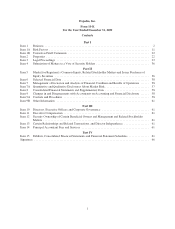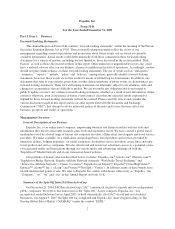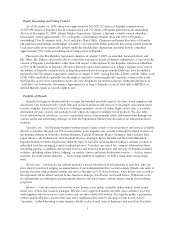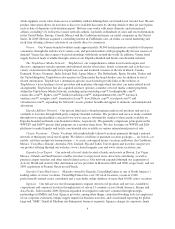Expedia 2009 Annual Report Download - page 17
Download and view the complete annual report
Please find page 17 of the 2009 Expedia annual report below. You can navigate through the pages in the report by either clicking on the pages listed below, or by using the keyword search tool below to find specific information within the annual report.Employees
As of December 31, 2009, we employed approximately 7,960 full-time and part-time employees, including
approximately 1,770 employees of eLong. We believe we have good relationships with our employees, including
relationships with employees represented by works councils or other similar organizations.
Part I. Item 1A. Risk Factors
You should carefully consider each of the following risks and uncertainties associated with our company
and the ownership of our securities. Additional risks and uncertainties not presently known to us or that we
currently deem immaterial may also impair our business and/or financial performance.
We operate in an increasingly competitive global environment.
The market for the services we offer is increasingly and intensely competitive. We compete with both
established and emerging online and traditional sellers of travel-related services, including online travel agencies,
travel suppliers, large online portal and search companies, traditional travel agencies, metasearch companies and
operators of travel industry reservation databases. Some of our competitors, particularly travel suppliers such as
airlines and hotels, may offer products and services on more favorable terms, including lower prices, no fees or
unique access to proprietary loyalty programs, such as points and miles. Many of these competitors, such as
airlines, hotel and rental car companies, have been steadily focusing on increasing online demand on their own
websites in lieu of third-party distributors such as the various Expedia sites. For instance, some low cost airlines,
which are having increasing success in the marketplace, distribute their online supply exclusively through their
own websites. Suppliers who sell on their own websites, in some instances, offer advantages such as increased or
exclusive product availability and their own bonus miles or loyalty points, which could make their offerings
more attractive to consumers than ours.
In addition, we face increasing competition from other online travel agencies, such as priceline.com,
Travelocity and Orbitz, which in some cases may have more favorable offerings for both travelers and suppliers,
including pricing, connectivity and supply breadth. In particular, we have faced and are facing intense
competition in Europe from Booking.com, a subsidiary of Priceline. We also compete with other travel agencies
for both travelers and the acquisition and retention of supply. Increasing competition from current and emerging
competitors, the introduction of new technologies and the expansion of existing technologies, such as metasearch
and other search engine technologies, may force us to make changes to our business models, which could affect
our financial performance and liquidity. Increased competition has resulted in and may continue to result in
reduced margins, as well as loss of travelers, transactions and brand recognition. We cannot assure you that we
will be able to compete successfully against current, emerging and future competitors or provide differentiated
products and services to our traveler base.
Global economic conditions have had and may continue to have an adverse effect on our business and
financial performance.
Travel expenditures are sensitive to personal and business discretionary spending levels and tend to decline
or grow more slowly during economic downturns, including downturns in any of our major markets. In late 2008
and 2009, there was a rapid deterioration of domestic and global economic conditions, and the outlook for 2010
is uncertain. This slowing of the domestic and global economies has increased unemployment and reduced the
financial capacity of both corporate and leisure travelers, thereby slowed spending on the services we provide,
particularly in the first half of 2009. We cannot predict the magnitude, length or recurrence of the recessionary
economic patterns. However, the continuation, or worsening, of domestic and global economic conditions could
continue to adversely affect our business and financial performance.
Declines or disruptions in the travel industry could adversely affect our business or financial
performance.
Our business and financial performance are affected by the health of the worldwide travel industry,
including by decreases in hotel occupancy rates, hotel average daily rates, decreases in airline capacity or
11
























